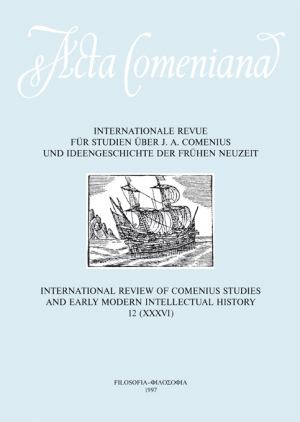Acta Comeniana 12
Internationale Revue für Studien über J. A. Comenius und Ideengeschichte der frühen Neuzeit. International Review of Comenius Studies
The volume of Acta Comeniana 12 (XXXVI) comprises ten articles devoted to the intellectual history of the Early Modern Period, presents two newly discovered historical documents important for Comenius studies (Marta Bečková, William J. Hitchens) and gives an overview of literary culture and education in Hungary in the light of the publishing explosion in Szeged (Zdeněk Hojda). Moreover, it includes a number of reviews of and notes on the recent literature from the field and the obituary of A. M. O. Dobbie written by Dagmar Čapková. The contributions are in English or German.
Howard Hotson deals with the Silesian, Bohemian and Moravian literary and personal contacts of Johann Heinrich Alsted and attempts to clarify, why the correspondence network of the Herborn encyclopaedist rests in the Eastern rather than Western Europe. Marta Bečková presents and analyses the correspondence of the elders of the Unity of Brethren from the Poznań State Archive. Using the example of the Hartlib circle and its papers, Mark Greengrass attempts to highlight the advantages of the “manuscript publication” in the 17th century in comparison with the “print culture”: its higher flexibility, its ethos of gift, its confidentiality. Vladimír Urbánek presents a chronological overview of the development of Comenius’ correspondence network and attempts – with the help of statistical processing of ca. 430 available letters – to reconstruct some of his circles of communication. Jiří Beneš investigates the late manuscript Clamores Eliae as a source of a better knoweldge of Jan Amos Comenius’ correspondence network. John Young takes the letters of the natural philosopher Johann Moriaen (c. 1592 – c. 1668) from the Hartlib papers as a starting point for his investigation of the pansophical appropriation of Vieta’s initially mathematical principle nullum non problema solvere by Comenius, Moriaen, Tassius, Dury and Pell. Jiří Kroupa analyses and classifies the available correspondence of the Bohemian Jesuit polymath Bohuslaus Balbinus (1621–1688). Jürgen Beer examines the laudatory and exhortatory political pamphlet Panegyricus Carolo Gustavo of J. A. Comenius, written in 1655. Viktor Viktora deals with a gratulation text written to the occasion of the wedding of Jan Amos Comenius’ daughter. Zdeněk Beneš presents an attempt to sketch a sociocultural profile of the historian Otakar Odložilík.
Published ten or more years ago, therefore, the price has been reduced to half.

378 pages, paperback
ISBN 80-7007-111-7

